When Sadlack’s Heroes moves downtown in January, leaving its longtime building to make way for an Aloft hotel, staples like the Turkey Applejack and Philly Sub will still make the menu. The same crew will man the bar and longtime owner Rose Schwetz will still scurry around day and night running the whole operation.
She’s working on a patio to offer the same live music and atmosphere that’s drawn NC State students to the Hillsborough Street hot spot since 1973.
But Schwetz is making other bets risky for a small business, let alone one of Raleigh’s longest standing ones. And she’s certainly not the first or the last legendary Raleigh company to take a chance on a new location after years of success in an old one.
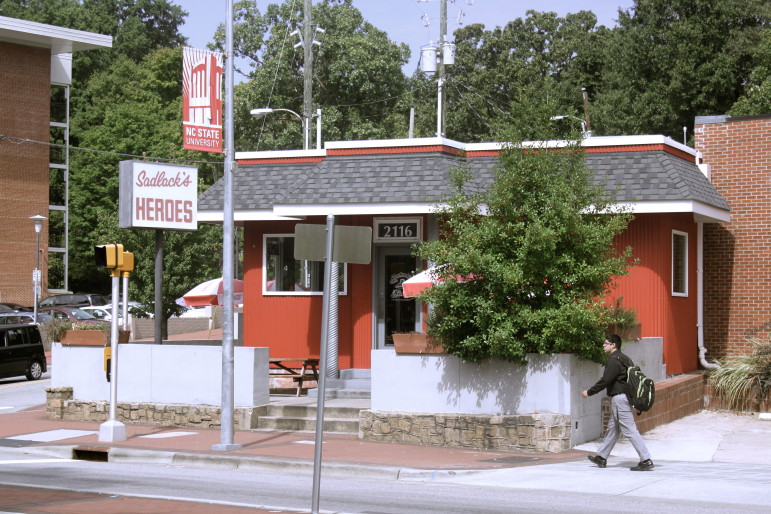
Laura Baverman / Raleigh Public Record
Sadlack's on Hillsborough Street
In coming months, Clyde Cooper’s Barbeque will move its 75-year-old restaurant on East Davie Street to make room for a six-story retail and residential building called the Edison. Reliable Jewelry Company, open on Wilmington Street since 1949, will move into that building just in time for its own historic property to be demolished to make room for more development.
All three expect business to be at least as usual following the moves. In each case, upgrades and expansions are planned. The owners expect long-time customers who want them to succeed to frequent the new spots. And news of a move may draw new people to come in for the first time.
“I know I’m supposed to be feeling sad, but so far it hasn’t hit me,” Schwetz said. “I’m not feeling sad—I’m looking forward to a new challenge.”
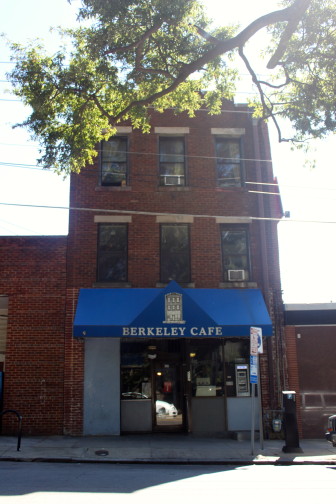
Laura Baverman / Raleigh Public Record
Through each generation of a business, the odds of failing grow. New leadership isn’t as eager as the last. Menus and inventory don’t evolve with the times. A location popular decades ago doesn’t have quite the draw. There’s no one to succeed the patriarch or matriarch. Competition from newer establishments is just too great.
But part of what makes these businesses special is the sameness. And how they adapt to the changing world around them, mixing their historic charm with the newness that customers want, could guide the future of other Raleigh businesses that hope to keep their followings for years to come.
The Downtown Move
“It’s a tough balance—having to learn things you never learned,” said Evelyn Scruggs-Murray, who helped move her family’s 139-year-old Briggs Hardware from downtown to Capital Boulevard in 1996. “But I think that’s what’s kept us going through generations. We used to be a wholesaler and then we did government contract work. There was always something new to change with the times. And now we’re on Facebook. Who knew?”
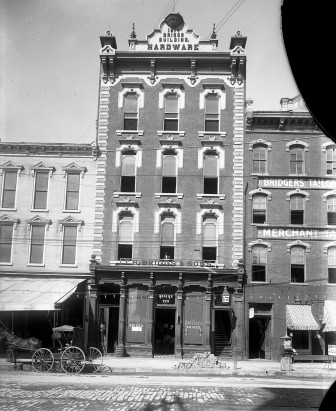
Briggs Hardware around 1910. The building remains today, now operating as the Raleigh City Museum.
Schwetz’s plan is to move Sadlack’s into the now-closed Berkeley Café on Martin Street. She’ll merge the two restaurants’ menus and enlarge the kitchen. She’ll remodel the interior and back patio. She’ll continue to book live bands. She recognizes she may leave behind some students who walked to the bar each day or night, but her new market includes all of the residents and workers downtown.
Reliable Jewelry, in coming years, will get a new storefront in the Edison at the corner of Davie and Wilmington streets. Alan Horwitz, a third generation owner in business with his dad Philip, said he’s not worried about the move. More customers are already coming downtown because of the new businesses to visit and places to work and live. That’ll only grow by the time Reliable is a few steps down the street from its longtime home.
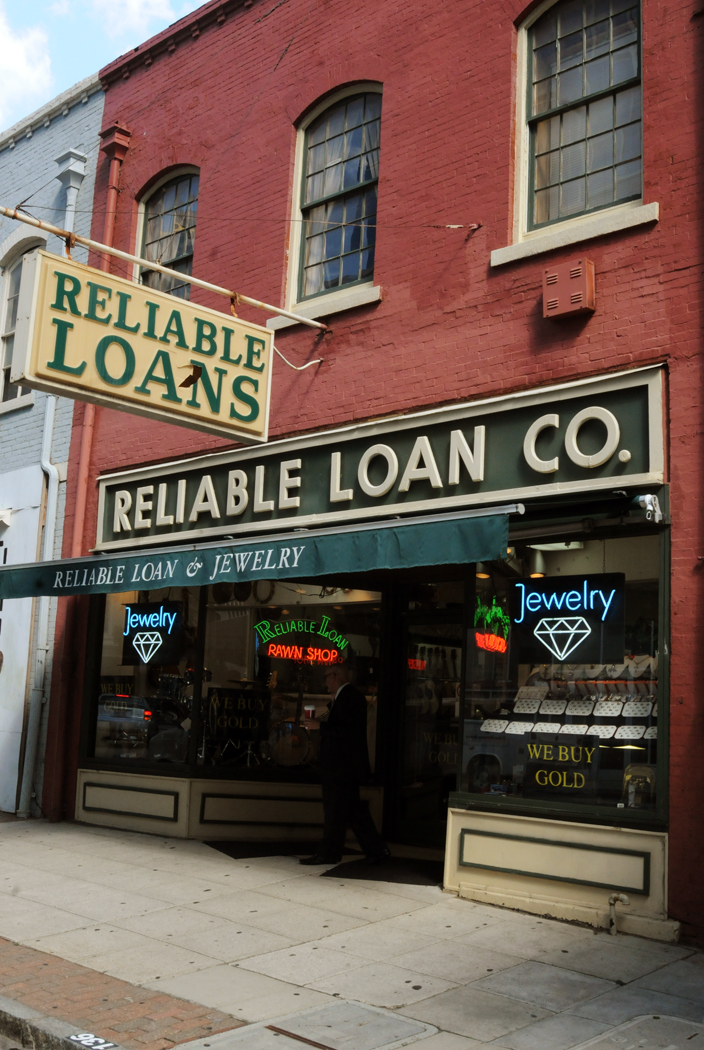
Karen Tam / Raleigh Public Record
The City of Raleigh helped Cooper’s find a new location just around the block by the parking deck on Wilmington Street, a building that owners Randy and Debbie Holt plan to purchase early next year. It’s significantly bigger—besides room for outdoor seating, there’s a much larger kitchen to grow the catering business that already makes up 75 percent of its sales. There’s talk of opening up for dinner and serving beer and wine for the first time.
But much of the decor that lines the walls floor-to-ceiling will stay. And there’s still debate about whether to accept credit cards from walk-in customers.
“We fought long and hard to keep this old place. We wanted to keep some of Raleigh’s history,” said Randy Holt. “A lot of cities lose their history by trying to revamp everything and keep it nice and shiny. It’s sad. But we have to look at the positive side instead of dwelling on things out of our hands.”
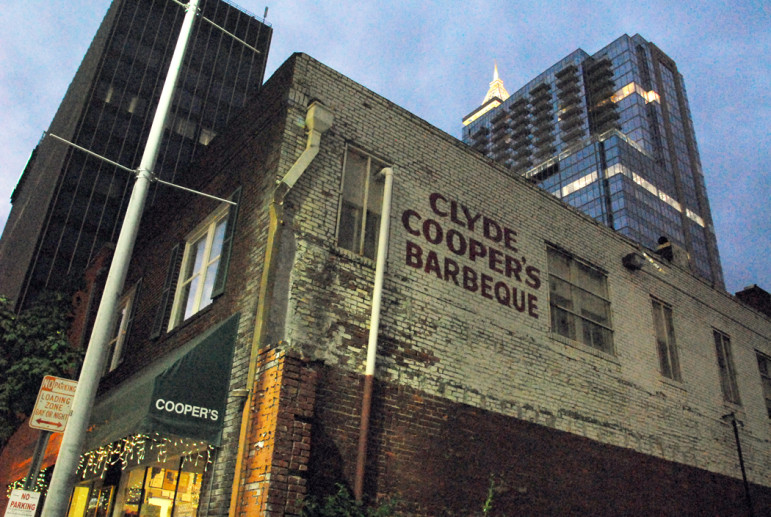
Karen Tam / Raleigh Public Record
Evening falls over the old Cooper's building.
But with all of the hope and expectations about the moves, there’s also careful planning and consideration required.
For example, there are costs associated with moving after a long time, in equipment, lease or mortgage rates, moving and renovation costs (and the down time associated with the move) and marketing expenses that businesses like Sadlack’s or Cooper’s had never incurred.
The More Things Change
And for every new expense, a small business has to bring in enough new sales to account for it, said Wayne Rivers, president and co-founder of the Family Business Institute in Raleigh. For many, no amount of marketing can make up for time not spent making and selling sandwiches or barbecue.
A strong neighborhood following is essential for small businesses to survive, said Karl Larson, a local historian and volunteer with the North Carolina State Archives. Cooper’s and Reliable aren’t moving far from their existing locations, but Sadlack’s will have to appeal to a new audience. And there’s no guarantee it will be as eager for the particular genre of live music, sandwiches and beers that attracted the students.
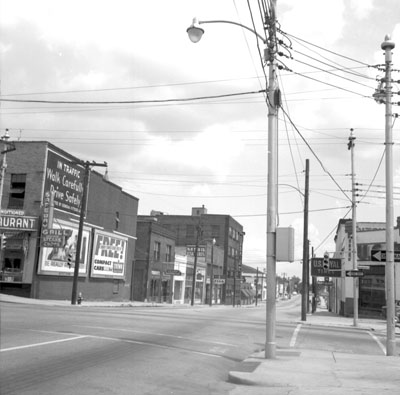
East Davie Street in Raleigh in the 1950s
Change will be required in each move. Customers will expect it. That’s why Briggs relocated its hardware store after the Fayetteville Street mall plan failed and the department stores moved out, Scruggs-Murray said. It’s why Mecca Restaurant had to reopen its bar, add dinner service in the evenings and offer brunch on Sundays, Larson said.
And why Askew-Taylor Paints shifted to an art supply store from paint sales, because most painters picked up their supplies from Home Depot or Lowe’s.
“The department stores left downtown and we had a virtual ghost town, but they managed to survive because they adapted to the market,” Larson said.
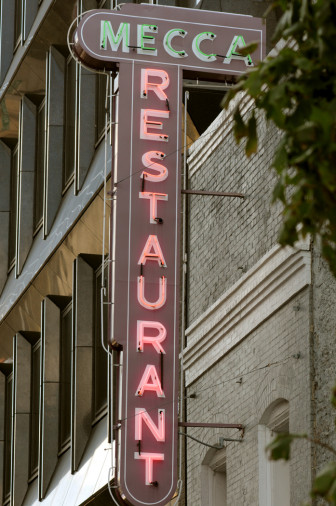
Karen Tam / Raleigh Public Record
Plenty of storied Raleigh businesses have stood the test of time. Besides Brigg’s, Askew-Taylor and Mecca, there’s Flythe’s Bicycles and the Hamlin Drug Co, There’s Johnson-Lambe Sporting Goods, Quail Ridge Books. the Rialto and the Hayes Barton and Person Street pharmacies. Player’s Retreat and Mitch’s Tavern have spent decades serving students.
But plenty of others haven’t. Recent examples of closed Raleigh staples include Clark Art Shop, Jolly’s Jewelers, the Raleigh Sandwich Shop, and now, the Berkeley Cafe.
Most of a business’s success ends up coming down to the motivation and drive of the owner, Rivers said, not the location or menu or decor. And not every family member, employee or anyone else is cut out for that job.
A recent day spent sorting through files of customers he’s helped with succession-planning since the 1980s revealed many examples of times it didn’t work out.
“I truly believe the statistic that 70 percent fail after the first generation,” Rivers said. “And another huge percent fail after the second. The secret of success in any business, especially a small one, is having one or more super dynamic, energetic and ambitious hungry people.”
“Businesses don’t go into cruise control, someone has to be driving the accelerator all the time,” Rivers said.
